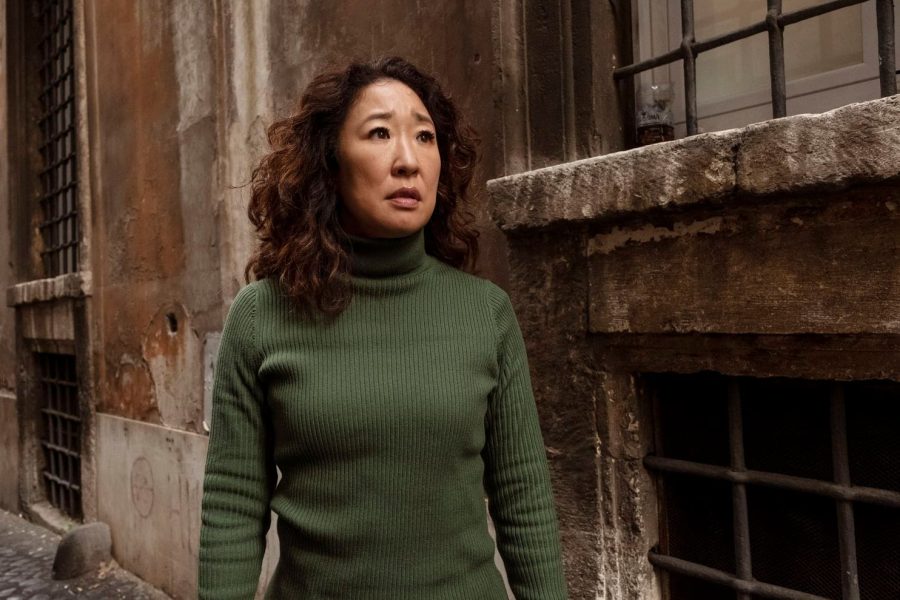Season two of “Killing Eve” kills its characters’ dreams — in the best possible way.
Contains major spoilers for season two of “Killing Eve.”
“After today, people will be angry,” assassin Villanelle (Jodie Comer) warns British intelligence detective Eve Polastri (Sandra Oh), in the penultimate scene of Sunday’s season-two finale of “Killing Eve.” The line falls just after Eve has murdered a man with an axe to the head — you never forget your first time — and just before Villanelle tearfully confesses her love for her. In effect, the finale, titled “You’re Mine,” is a microcosm of everything this season has been trying to do. Showrunner Emerald Fennell, taking over from creator Phoebe Waller-Bridge, ramped up the violence all season, both from Eve and Villanelle and from the men around them. She also turned up the volume on the lesbian attraction that drives Villanelle and Eve’s relationship, drawing subtext out into text. While Villanelle spends the season realizing she’s fallen in love with Eve (or at least the idea of her), Eve spends it coming to grips with the fact that she thinks Villanelle is really, really sexy.
The finale, though, ultimately left many viewers feeling frustrated, or in some cases even queer-baited. After a season of increasing sexual and romantic tension, Villanelle’s fantasies of running off into the sunset with Eve are dashed. Eve realizes that her first kill was orchestrated by Villanelle, and that Villanelle could’ve killed the violent misogynist — her former handler, Raymond (Adrian Scarborough) — who she insists Eve has to chop to bits, herself. This comes on the heels of the realization that Eve’s MI6 mission has been a setup. Her boss Carolyn (Fiona Shaw), played to icy perfection, sent her to Rome with the intention of killing creepy big-data mogul Aaron Peel (Henry Lloyd-Hughes), not just to extract information from him using Villanelle’s feminine wiles. It’s all too much for Eve. The illusion she’s had all season of being able to turn Villanelle toward the light is shattered. Villanelle tries to kiss her and Eve pushes her away. She admits she loves Eve, increasingly distressed, and Eve tells her she doesn’t know what love is. Both women are forced to realize that the other isn’t what they thought, and that being equal does not make them the same. The pressure of that idea culminates in an incident foreshadowed back in the fifth episode. Eve trusts so strongly that Villanelle won’t, or can’t, hurt her that she turns her back on a very upset Villanelle, who is holding a loaded gun. As Eve tries to walk back into her old life, Villanelle shoots her in the back. The season ends with an aerial shot of Eve lying face down, bleeding out from the same spot in which she famously stabbed Villanelle during the season one finale.
Sure, our dynamic duo is separated, and the borderline lovey tone of the season has flipped back to the fear and loathing we came to expect from season one, but fans worried about the cliffhanger we’re left on should take heart in the fact that “Killing Eve” was renewed for a third season within twelve hours of this season’s premiere. We knew going in that this wasn’t going to be where it ended. Things don’t look good for Eve and Villanelle, but without both of them, and the push-and-pull relationship between them, the show simply is not possible. All of the narrative and character development throughout “Killing Eve”’s arc relies on these characters changing and shaping each other to meet at a middle ground. Eve finds her own inner darkness; Villanelle finds herself newly vulnerable and learns how to feel.
Season two succeeds because of this shifting dynamic, in that it brings the relationship between Eve and Villanelle into reality. These characters have spent so much time apart thinking about each other, imagining each other, longing for each other, and recognizing parts of themselves in each other, but they’ve never had to contend with each other face-to-face. As season two ends, Eve and Villanelle are no longer yin and yang, each trying to bring the other under her influence. They are forced to recognize each other as whole people, in shades of gray, and only time and season three will tell if they’re able to reconcile reality with their ideals. Based on what we’ve been given so far, it’s safe to guess that there’s hope yet — because from where they’ve been, there’s no coming back.
Grade: A
Director: Emerald Fennell
Starring: Sandra Oh, Jodie Comer, Fiona Shaw
Premiered: Apr 7, 2019 on BBC America
Image courtesy of Washington Post.














